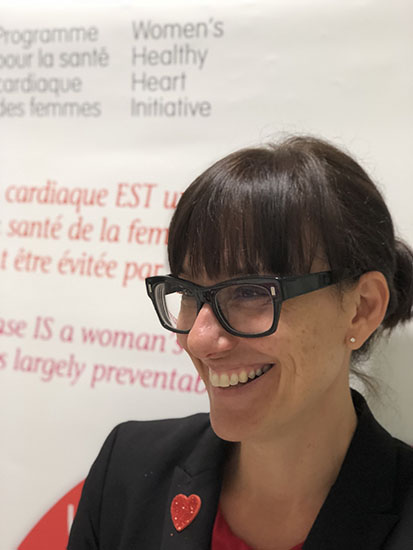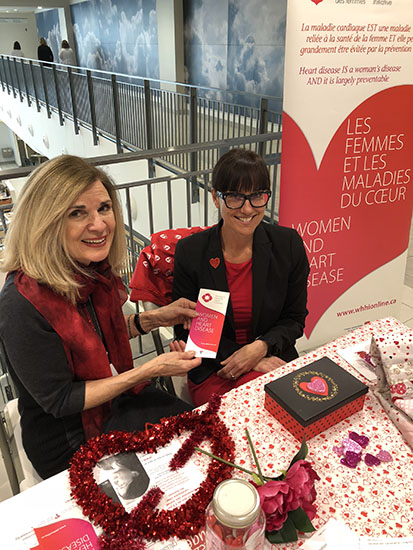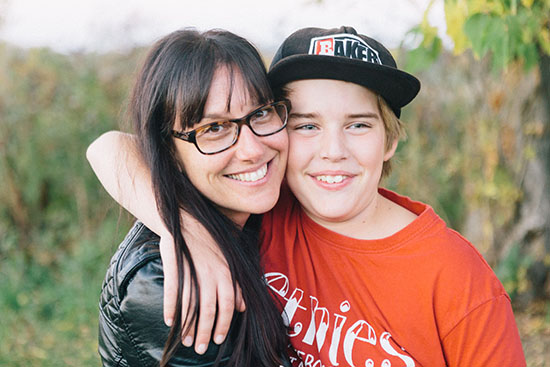Defusing a Ticking Time-Bomb: The Women's Healthy Heart Initiative
“When a woman has a family and has a heart attack, the whole family explodes. The house exploded. Everything came to a standstill. The activities, the cooking, and the groceries – it’s like a bomb went off in my family. It changed my life.
“And the people at the Women’s Healthy Heart Initiative (WHHI) understood that.”
Susan Rodrigues was 40 and standing in line at the bank when she suffered a heart attack.
“Life was really busy. I was self-employed, living a high-stress life that included lots of travel and, as I was standing there, I suddenly felt nauseous and had a pain in my jaw and ear. It felt like someone was putting a knife in my ear,” the now 48-year-old recounts.
Rodrigues had been suffering from fatigue, nausea, dizziness and the flu-like symptoms that often accompany women with heart disease, which are also different from the symptoms felt by a man.

But she dismissed them as part of the daily trials of managing the demands of a hectic professional career and the family household, including a young son.
“Twelve months before my heart attack I went to my GP and I said I didn’t feel well and I didn’t know why. Both of my parents had died of heart disease, it was in my history. But neither one of us even thought to look at my heart because I was only 39,” Rodrigues said. “I don’t drink a lot, I don’t smoke, and I never did drugs. If you had asked me in that moment if I felt stressed I would have said no, this is life with a toddler. This is the way it is.”
But as Rodrigues quickly learned, this wasn’t necessarily how it had to be.
Unhappy with the treatment she was receiving following her heart attack, Rodrigues got in her car and made the 95-minute plus drive to visit the not-for-profit WHHI at the Royal Victoria Hospital.
Clinic Improving Heart Health
With heart disease the leading cause of premature death for women in Canada, the novel, nurse-led clinic focuses primarily on preventative cardiac care for women.

Founded by nurse-clinician Wendy Wray in 2009, the Glen-site clinic is open to women aged 45 to 65 and a referral is not necessary.
Patients are assessed before coming together with a nurse and physician to formulate a plan of best methods and preferences for improving their heart health. This nurse-led practice is a model of collaborative nurse-physician care.
Heart disease can present itself differently in women compared to men with symptoms sometimes harder to diagnose as they can mirror everyday maladies, making prevention key.
“I want to empower women. That’s what the project is all about. We give women the right questions to ask their doctors about their heart health,” said Wray, who has found the collaborative and supportive surroundings of the MUHC the perfect backdrop to promote this unique-to-Canada program.
“The focus of our disease prevention care is about achieving a healthier lifestyle and should medication be necessary we provide the appropriate information and support to the patient for her decision-making,” Wray said. “Our approach is patient-centered so, in essence, the patient is in the driver seat while we support them in reaching their health goals. These can include lowering elevated blood pressure, high cholesterol, and avoiding diabetes.”
For Rodrigues, the WHHI - which is completely funded by its patients and caregivers - offered much needed clarity following a turbulent period post-heart attack.
The Right Recovery
“After a year of struggles with treatment, I came to the clinic and that’s when my real recovery started. The emotional support you get from the group is amazing. It was really subtle – like a hand-holding rather than a whipping,” said Rodrigues, who found her concerns and symptoms were being dismissed.
“No one knew what to do with me – I was the first young person they had seen with a heart attack. They dismissed the idea that I had suffered a heart attack and put my symptoms down to emotional distress,” Rodrigues, who was never educated about the consequences of a heart attack, said. “After four days, I was finally given an angioplasty, which revealed four blockages. Suddenly, I found myself needing to consent to having a drug-eluting stent put in when I had no idea what was happening. I freaked out. Everything happened so quickly and I was so ill-prepared that when I came out I was crying and hyper-ventilating.”
Rodrigues said the WHHI looked to speak to her rational side rather than focusing on the emotional.
“Everyone would say the problem was in my head but Wendy was the first to say it wasn’t in my head. This was really liberating for me. I’m not a crazy person because of how I felt. I didn’t want to tell anyone how I felt because they thought I was crazy.”
“Because you weren’t,” Wray interjects, “never say that!”
Rodrigues said the WHHI was instrumental in helping turn her life around as her marriage suffered as a result of her health.
“My husband and I didn’t make it through the heart attack. We tried very hard but we didn’t survive that health crisis together,” said Rodrigues, who has since moved to Montreal with her teenage son.
Rodrigues has had to make major sacrifices to her lifestyle since she knows that a second heart attack could be fatal.

She admits to feeling like a “ticking time-bomb,” which has led her to alter her day-to-day living. Simple pleasures like hamburgers now come with the price of four days of pain as her inflamed body struggles to digest a meal most take for granted.
The WHHI supported her in understanding the lifestyle choices she would need to tweak.
“I didn’t feel alone anymore. If there were other young women who had heart attacks, she has linked us up together and now I have a support group to talk with. No one can understand it until you meet someone who had the same condition,” said Rodrigues, who has had to dramatically reduce her work habits and work life as the evolving modern day lifestyle takes a toll on women’s heart health.
“As women take on more responsibility in the work place, they are more at risk. I see a lot of women in my age group wanting to understand it better because they want to stay healthy longer.”
For more information, visit www.whhionline.ca and click here to support the WHHI. And get your heart checked today.